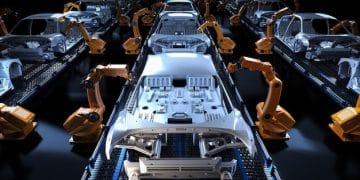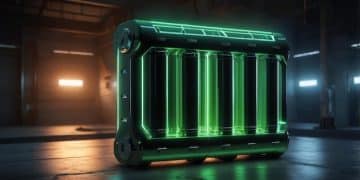AI Revolution: How Artificial Intelligence Is Transforming Car Manufacturing
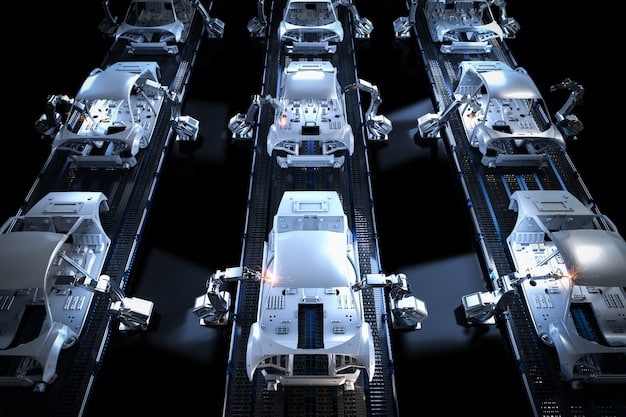
Artificial intelligence (AI) is revolutionizing car manufacturing processes by optimizing design, enhancing production efficiency, improving quality control, and paving the way for autonomous driving technologies.
The automotive industry is undergoing a massive transformation, and at the heart of this revolution lies artificial intelligence (AI) revolutionizing car manufacturing processes. From design to production and beyond, AI is driving efficiency, improving quality, and enabling innovations that were once considered science fiction.
How AI Enhances Car Design and Development
AI is dramatically changing the way cars are designed and developed. By analyzing vast amounts of data and simulating various scenarios, AI algorithms can optimize vehicle designs for performance, safety, and efficiency.
AI-Powered Simulation
AI algorithms can simulate crash tests and aerodynamic performance, drastically reducing the time and cost involved in physical prototyping. This allows manufacturers to explore more design options and identify potential issues early in the development process.
Generative Design
Generative design, powered by AI, enables engineers to input design goals and constraints, and the AI generates a multitude of design options that meet those criteria. This leads to lighter, stronger, and more efficient vehicle components.
- Faster Development Cycles: AI reduces the time needed to design and test new vehicles.
- Improved Performance: AI optimizes designs for better fuel economy, handling, and safety.
- Cost Reduction: Fewer physical prototypes and tests save money.
Ultimately, AI-enhanced design and development processes lead to cars that are safer, more efficient, and better aligned with consumer needs and environmental standards.
AI in Manufacturing: Boosting Efficiency and Precision
AI is transforming car manufacturing floors by boosting efficiency and precision. Through the use of robotics, predictive maintenance, and real-time data analysis, AI is minimizing downtime, reducing waste, and improving the overall quality of the vehicles produced.
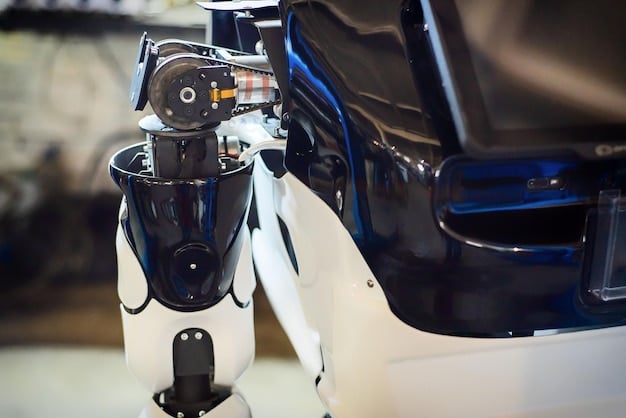
Robotics and Automation
AI-powered robots perform repetitive and complex tasks with unparalleled precision and speed. These robots can handle everything from welding and painting to assembly and quality inspections, freeing up human workers to focus on more strategic tasks.
Predictive Maintenance
AI algorithms analyze data from sensors on manufacturing equipment to predict when maintenance is needed. This prevents breakdowns, minimizes downtime, and extends the lifespan of the equipment.
- Increased Production Speed: AI-powered robots work faster and more consistently than humans.
- Reduced Errors: Automation minimizes the risk of human error.
- Optimized Resource Use: Predictive maintenance reduces waste and ensures equipment runs efficiently.
AI technologies are not only making car manufacturing more efficient but also safer and more sustainable.
Quality Control: Ensuring Perfection with AI Vision Systems
Quality control is paramount in the automotive industry, and AI is revolutionizing how manufacturers ensure their vehicles meet the highest standards. AI vision systems can detect even minor defects, ensuring that only perfect products make it to the market.
Advanced Defect Detection
AI-powered cameras and sensors can identify defects that are invisible to the human eye. These systems analyze images and data in real-time to detect scratches, dents, and other imperfections.
Real-Time Monitoring
AI systems continuously monitor production processes, identifying potential quality issues before they become major problems. This allows manufacturers to take corrective action quickly, preventing defective products from reaching consumers.
AI vision systems ensure comprehensive quality control, safeguarding both the manufacturer’s reputation and the consumer’s safety.
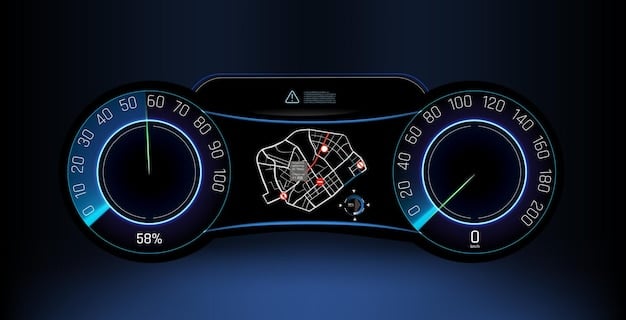
Supply Chain Optimization: AI-Driven Logistics
AI is playing a critical role in optimizing automotive supply chains. By analyzing vast amounts of data, AI algorithms can predict demand, optimize inventory levels, and streamline logistics, ensuring that the right parts and materials are available at the right time.
Demand Forecasting
AI algorithms analyze historical sales data, market trends, and external factors to accurately forecast demand for vehicles and parts. This allows manufacturers to adjust production schedules and inventory levels accordingly.
Inventory Management
AI optimizes inventory levels by predicting when parts and materials will be needed. This reduces the risk of stockouts and minimizes holding costs.
- Reduced Lead Times: AI helps manufacturers get parts and materials faster.
- Lower Costs: Optimized inventory levels reduce holding costs.
- Improved Responsiveness: AI enables manufacturers to respond quickly to changing market demands.
An AI-powered supply chain enhances efficiency and agility, giving manufacturers a competitive edge.
Personalization and Customization: Tailoring Cars to Customer Preferences
Consumers increasingly demand personalized products, and AI is enabling car manufacturers to offer unprecedented levels of customization. From tailored designs to personalized driving experiences, AI is making it possible to create cars that meet individual customer preferences.
Custom Design Options
AI algorithms can analyze customer preferences and generate custom design options. This allows customers to create cars that reflect their unique style and tastes.
Personalized Driving Experiences
AI can personalize the driving experience by adjusting settings such as seat position, climate control, and infotainment preferences based on the driver’s habits and preferences.
AI empowers manufacturers to create highly personalized cars, enhancing customer satisfaction and loyalty.
The Future of Car Manufacturing with AI: Trends and Predictions
The integration of AI in car manufacturing is just beginning. As AI technology continues to advance, we can expect even more profound changes in the automotive industry. Here are some trends and predictions for the future:
Autonomous Factories
AI will enable the development of fully autonomous factories where robots and AI systems manage the entire production process without human intervention. These factories will be highly efficient, flexible, and responsive to changing market demands.
AI-Driven Innovation
AI will drive innovation by identifying new materials, designs, and technologies that can improve vehicle performance, safety, and sustainability. This will lead to the development of next-generation vehicles that are far more advanced than today’s models.
Looking ahead, AI will continue to reshape car manufacturing, driving progress and creating new opportunities.
| Key Point | Brief Description |
|---|---|
| 🤖 AI-Enhanced Design | Optimizes car designs for better performance and safety through simulation. |
| 🏭 Robotics and Automation | Increases production speed and reduces errors in manufacturing processes. |
| 🔍 AI Quality Control | Ensures high standards by detecting defects with AI vision systems. |
| 🚚 Supply Chain Optimization | Streamlines logistics and inventory management using AI demand forecasting. |
Frequently Asked Questions
▼
AI improves car design by simulating performance, optimizing designs for efficiency, and reducing the time and cost associated with physical prototyping.
▼
AI vision systems can detect defects invisible to the human eye, ensuring that only high-quality products reach the market. This enhances overall reliability.
▼
AI optimizes the supply chain by predicting demand accurately, managing inventory effectively, reducing stock outs, and minimizing logistical costs, ensuring materials are ready.
▼
Generative design, powered by AI, generates multiple design options based on specific goals and constraints. It ensures that final choices can maximize safety and efficiency.
▼
AI enhances personalization by gathering preferences and customizing vehicle designs, creating driving experiences tailored to individual drivers and passengers.
Conclusion
Artificial intelligence (AI) is revolutionizing car manufacturing processes from design and production to quality control and supply chain optimization. By embracing AI technologies, manufacturers can create cars that are safer, more efficient, and more personalized, while also driving down costs and improving sustainability.


